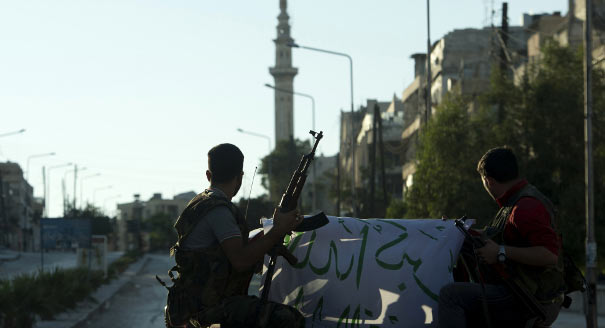Something interesting, and potentially very important, is happening in the Ghouta suburbs east of Damascus. The city of Douma has long been a stronghold of the insurgency, and several armed factions are active in the area, many of them with an Islamist bent. One, the Islam Brigade of the Alloush family, has over time grown quite a bit bigger than the others, particularly after it claimed responsibility for the July 18, 2012 attack against the National Security Office in Damascus, which killed several leading Syrian security figures.
In March 2013, the main factions of the area joined forces in a local body called the Douma Mujahedin Council. The new group included the Islam Brigade, the Douma Martyrs' Brigade, the Ghouta Lions Brigade, the East Ghouta Revolutionaries' Brigade, the Lions of God Brigade, the Tawhid al-Islam Brigade, the Farouq Brigade [Liwa al-Farouq], the Shabab al-Hoda Brigade, the Seif al-Omawi Battalions, the Military Police Battalion, the Regime Protection Battalion, and the al-Ishara Battalion.
Abu Subhi Taha of the large and well-established Douma Martyrs’ Brigade was appointed president, while Zahran Alloush of the Islam Brigade led the Shoura Council, its politico-religious executive body.
Zahran Alloush then went on to greater things, supported by a generous flow of money from the Gulf. By summer, he was widely viewed as one of the most powerful insurgent commanders in Syria. But complaints were beginning to emerge from within his core areas in east Damascus, with minor factions and anti-Islamist groups chafing at the heavy-handed tactics and Salafi ethics of the Islam Brigade. In September, the prominent secular human rights activist Razan Zeitoune was threatened by Alloush loyalists over her criticism, but refused to back down; instead, she accused them of wanting to stifle dissent in the same way as Assad.
Later that month, Alloush transformed his Islam Brigade into the more grandly named Islam Army, with the addition of a few extra factions — most of them in the Damascus region, but also a handful in places like Idleb, Deraa or Aleppo. Then things started to go wrong. Immediately after the September announcement, several powerful Islamist groups publicly ended a separate, Damascus-wide leadership collaboration with the Islam Army, complaining that the Kuwaiti Salafi sponsors of the the project had tried to use their financial clout to force them to obey Zahran Alloush. If there was indeed a foreign push to enthrone Alloush as king of the Damascus rebels, it now seemed to be backfiring.
Then, the Douma Mujahedin Council imploded. Its president Abu Subhi Taha suddenly decided that the growing discontent in Douma was forcing him to dissolve all other local councils and revolutionary bodies — including the Shoura Council of Zahran Alloush. Judging by appearances, it was a straighforward coup against the Islam Army leader.
On October 13, the new council structure was set up, presumably marginalizing Alloush’s adherents in favor of Abu Subhi Taha and his allies. Another faction of the Douma Mujahedin Council then issued a counter-declaration saying that they represented the Council’s majority, that Abu Subhi Taha’s decision was invalid, and that he was no longer their president. A spokesperson for Zahran Alloush chimed in with a harsh attack on new leadership, saying they were breaking up the ranks of the Muslim community and had collaborated with the Assad regime. A group of civilian activists, non-Islamists by the look of it, then reacted to that by issuing their own statement of protest against Alloush, accusing him of trying to assume dictatorial powers by way of the gun.
And now, what on earth is going on? Is this just the recriminations of another failed rebel coalition, or is it the beginning of a more serious conflict? The weeks ahead will tell, and it is an important issue. Eastern Ghouta is where the regime fired most of its chemical shells on August 21, and it has long been a priority target in Assad’s attempt to consolidate his hold on the capital. If the rebel movement there should collapse into infighting, the regime stands to gain immensely.






